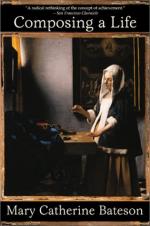
|
| Name: _________________________ | Period: ___________________ |
This test consists of 5 multiple choice questions, 5 short answer questions, and 10 short essay questions.
Multiple Choice Questions
1. Why are men often encouraged to remove distractions from their lives?
(a) So they can become experts in their field.
(b) To ensure maximum financial success.
(c) Because the male brain is wired differently than female brains.
(d) So they can concentrate on one thing at a time.
2. How many sons does Johnnetta have?
(a) Five.
(b) Four.
(c) Three.
(d) Two.
3. In what situation does Mary describe children as caregivers?
(a) As carers for pets.
(b) As carers for imaginary friends.
(c) As carers for parents.
(d) As carers for siblings.
4. According to Mary, what is the danger in gardening?
(a) Vandals may steal or destroy your flowers.
(b) You may have abundant growth that you cannot maintain.
(c) Your neighbor may covet your garden.
(d) Your flowers and produce may never grow.
5. After the debacle of her presidency, what did Mary learn was an important element to a happy life?
(a) Naivety.
(b) Skepticism.
(c) Strength.
(d) Trust.
Short Answer Questions
1. Which word completes the following sentence: "All of the women in the book have repeatedly salvaged the capacity for ______________ in an imperfect system"?
2. To what food item did Joan compare her first home with Erik?
3. In what way does Mary describe women who are multi-taskers?
4. Which of the following is NOT a sickness Joan's children suffered from when they were young?
5. Why didn't Mary ever step up as president at the college where she once worked?
Short Essay Questions
1. How does Johnnetta feel about the need to divide her time between her private and personal lives?
2. What is Mary's definition of wisdom?
3. In what way does Ellen's home define her life?
4. How do the multiple roles women fill in their daily life affect their self-identity?
5. What two metaphors does Mary use to describe her emotions in dealing with the Amherst presidency?
6. Why didn't Mary ever become president of Amherst University?
7. What leads Mary to the statement that all five of the women profiled in the book are "idealists"?
8. What is the main difference between men and women in regards to "multiple lives"?
9. In what way does "The Ode of Imru'u I-Qays" support Mary's arguments about multiple lives?
10. In what ways is leading multiple lives similar to having "heightened wisdom"?
|
This section contains 1,002 words (approx. 4 pages at 300 words per page) |

|




